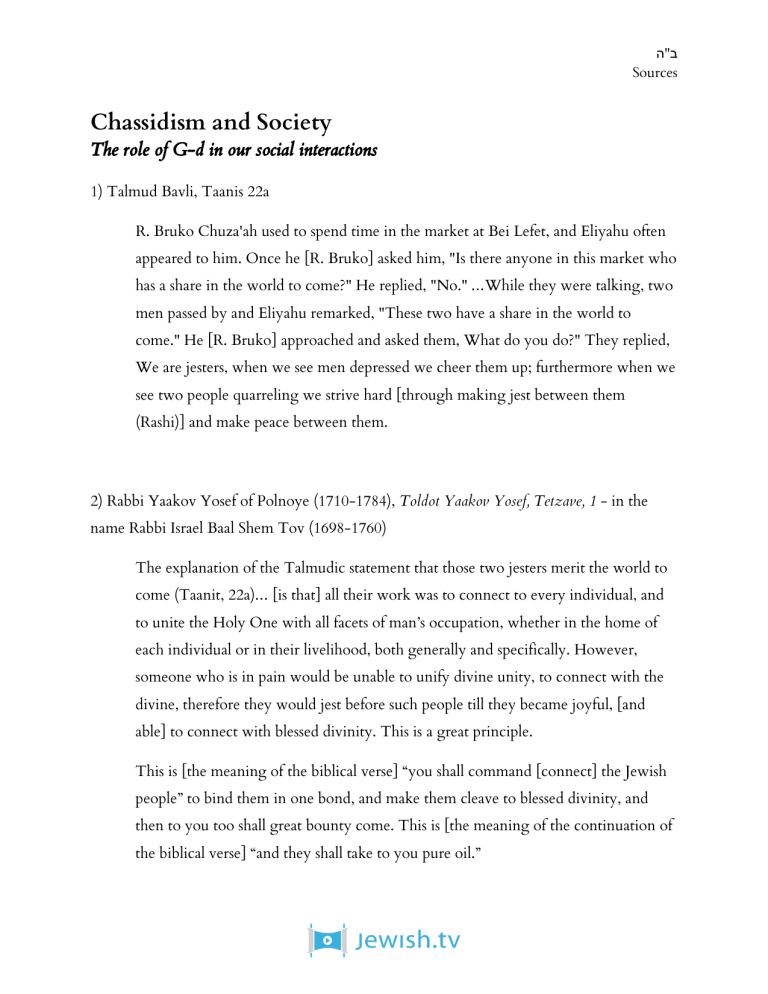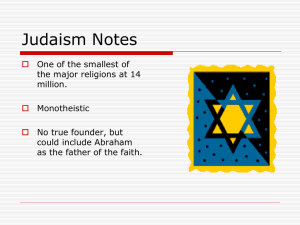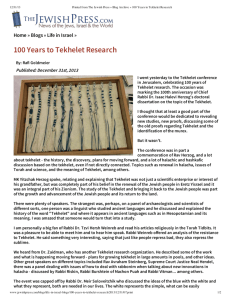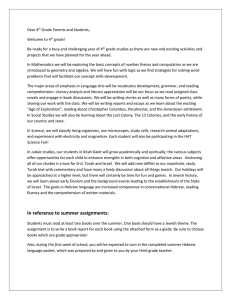Chassidism and Society The role of G-d in our social interactions

ה " ב
Sources
Chassidism and Society
The role of G-d in our social interactions
1) Talmud Bavli, Taanis 22a
R. Bruko Chuza'ah used to spend time in the market at Bei Lefet, and Eliyahu often appeared to him. Once he [R. Bruko] asked him, "Is there anyone in this market who has a share in the world to come?" He replied, "No." … While they were talking, two men passed by and Eliyahu remarked, "These two have a share in the world to come." He [R. Bruko] approached and asked them, What do you do?" They replied,
We are jesters, when we see men depressed we cheer them up; furthermore when we see two people quarreling we strive hard [through making jest between them
(Rashi)] and make peace between them.
2) Rabbi Yaakov Yosef of Polnoye (1710-1784), - in the name Rabbi Israel Baal Shem Tov (1698-1760)
The explanation of the Talmudic statement that those two jesters merit the world to come (Taanit, 22a) … [is that] all their work was to connect to every individual, and to unite the Holy One with all facets of man’s occupation, whether in the home of each individual or in their livelihood, both generally and specifically. However, someone who is in pain would be unable to unify divine unity, to connect with the divine, therefore they would jest before such people till they became joyful, [and able] to connect with blessed divinity. This is a great principle.
This is [the meaning of the biblical verse] “you shall command [connect] the Jewish people” to bind them in one bond, and make them cleave to blessed divinity, and then to you too shall great bounty come. This is [the meaning of the continuation of the biblical verse] “and they shall take to you pure oil.”
Sources
3) The Rebbe, Rabbi Menachem Mendel Schneerson (1902-1994), Ve’atah Tezave 1981, citing Rabbi Yosef Yitzchak Schneersohn of Lubavitch
This is [the meaning of] “you shall command [connect] the Jewish people,” that
Moshe is the one who connects the Jewish people to the ohr ain sof … through this
Moshe is improved and enhanced. This is because Moshe and the Jewish people are comparable to the head and foot … the Jewish people are the feet of Moshe, and
Moshe is their head. Just as with a person, the feet carry the head to a place where the head alone would not be able to reach, so it is with the Moshe and the Jewish people, that the through the Jewish people (Moshe’s feet) and ascent is added for Moshe …
“and they shall take to you pure oil … ”
4a) The Tzemach Tzedek, Rabbi Menachem Mendel Schneersohn of Lubavitch
(1789-1866), Derech Mitzvosecha, Mitzvas Ahavas Yisra’el, 28a
The saying of Hillel the Elder to the convert is well known: “That which is hateful to you, do not do to your fellow. This is the entirety of the Torah, and the rest is explanation.” (Talmud Bavli, Shabbat 31a.)
In truth this is not very well understood. This all very well regarding the commandments [that govern the relationship] between man and his fellow, but what will you say about the commandments [that govern the relationship] between and
G-d?
4b) The Tzemach Tzedek, Rabbi Menachem Mendel Schneersohn of Lubavitch
(1789-1866), , citing Rabbi Chaim Vital (1542-1620), student of the Arizal
All the Jewish people are mystically one body of the soul of Adam Harishon
(primordial man) … and each individual Jew is a specific limb, and from this is [the principle of] mutual responsibility [derived], that a person is responsible for his fellow
Sources if he sins, and therefore my master [the Arizal] customarily made the confessions
[that are part of daily prayer liturgy], because all the Jewish people are one body.
4c) The Tzemach Tzedek, Rabbi Menachem Mendel Schneersohn of Lubavitch
(1789-1866),
It is explained elsewhere with regard to supernal man [that is, the realm of , what we might call the divine blueprint of the created cosmos] that it is in the aspect of revealed G-dliness of the realm of [divine qualities] are encompassed of one another, [the divine quality of] kindness encompassing [the divine quality of] discipline, and discipline encompassing kindness, and so on — whereas in they are segregated …
This inter-encompassment ( ) is achieved through drawing forth the revelation of the infinite which encompasses the entire chain of being, and all the specific things that exist. It is written [of G-d] “all is from you” (
29:14), and therefore it is G-d who also causes their inter-encompassment after they have emerged as individual entities … Accordingly, in you is the other too, and you shall love your friend as yourself.
4d) The Tzemach Tzedek, Rabbi Menachem Mendel Schneersohn of Lubavitch
(1789-1866),
The explanation of the commandment “love your fellow as yourself” in a deep way is in the way that a person doesn’t see their own deficiency.
This doesn’t mean that you don’t know your deficiencies. On the contrary you are able to see and well understand the depth of your depravity more than any other person can see. For another person only sees that which is apparent to the eyes but you can see into your own heart. Rather this means that the deficiency doesn’t grasp
Sources hold of you and make you upset, and [in this respect] it is as if you don’t see it all.
Because due to the great love, that you greatly love yourself, all your iniquities, though you know about them, are masked by love … from knowledge they are not drawn into emotional disturbance …
[Similarly regarding your fellow:] Do not see his deficiencies and inequities, whether in social matters. whether in spiritual matter, as a glaring issue. Rather your love to him shall be so great that it shall mask the inequities, and you will not allow them to come from knowledge to emotional disturbance …
This is the entirety of the Torah, that through the inter-encompassment of the souls of Israel with one another, so that they become one … this causes above a wondrous thing, which is the foundation and goal of the entire Torah, that is the unity of G-d’s transcendence and the indwelling of G-d in the world … that G-d is united with the
Jewish people and they become as one. And the supernal man [G-d] does not see any deficiency in His own self, and therefore He forgives all the iniquities of the Jewish people … This doesn’t mean … that they are hidden from Him, for all is revealed and know before him … rather as it is written “he saw iniquity but didn’t contemplate it”
(Iyov 11:11), that it isn’t drawn from His knowledge … into emotional disturbance and judgement …
This why Hillel said “the rest is commentary,” for all the commandments are for the sake of uniting G-d’s transcendence with the indwelling of G-d in the world …



